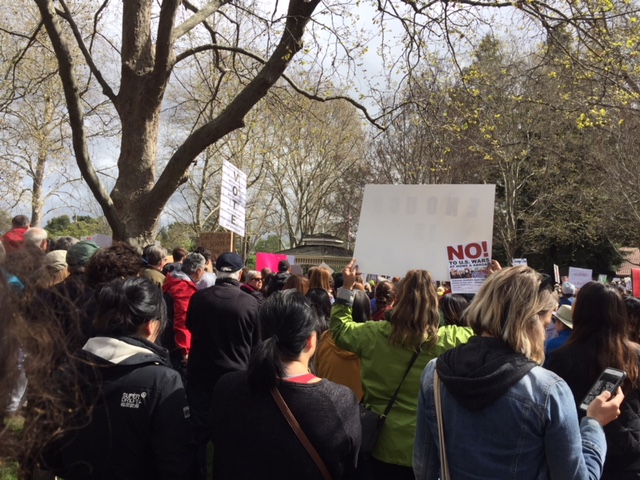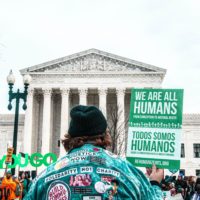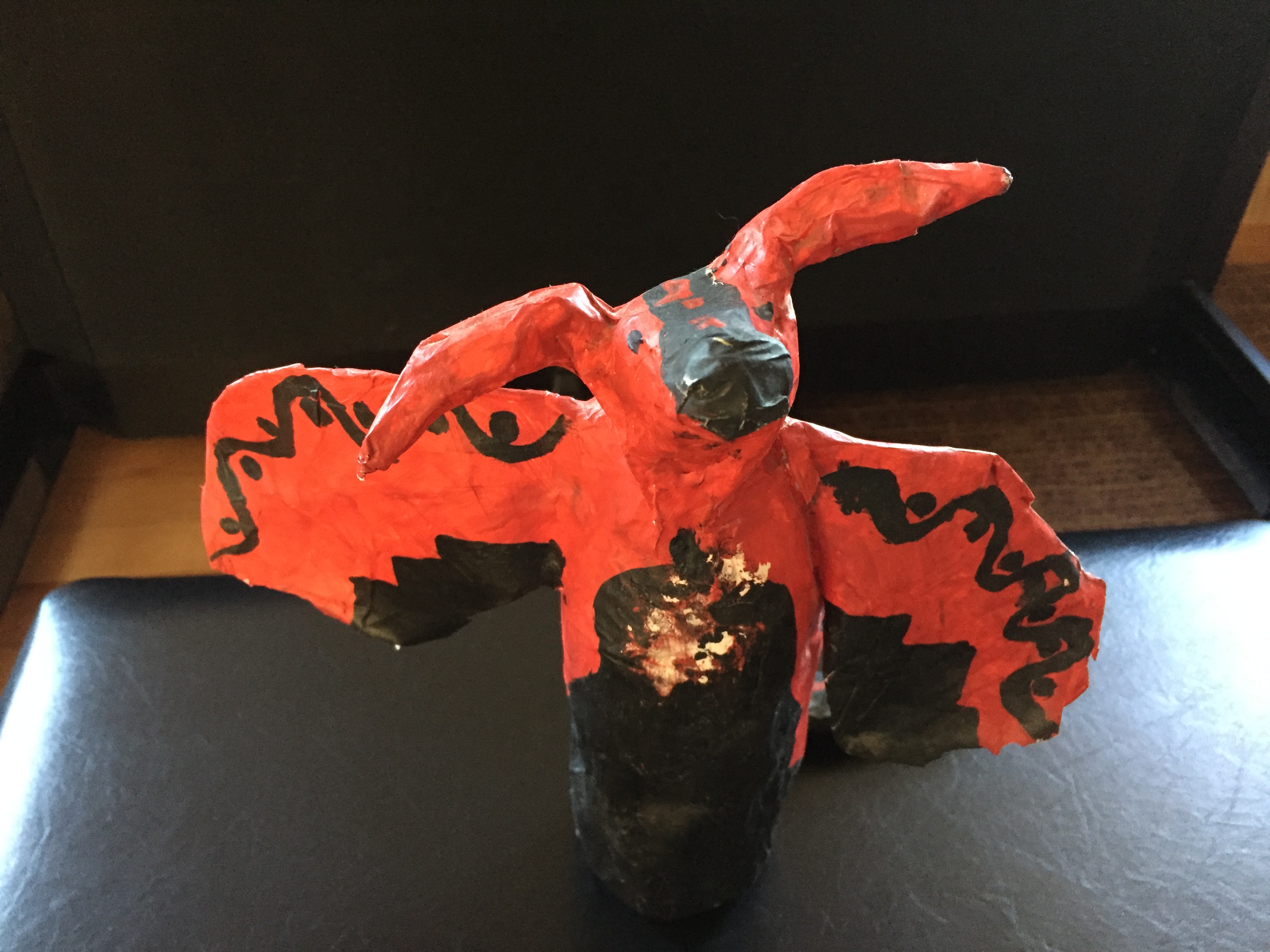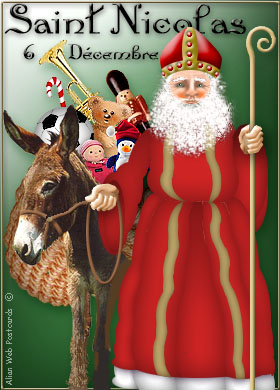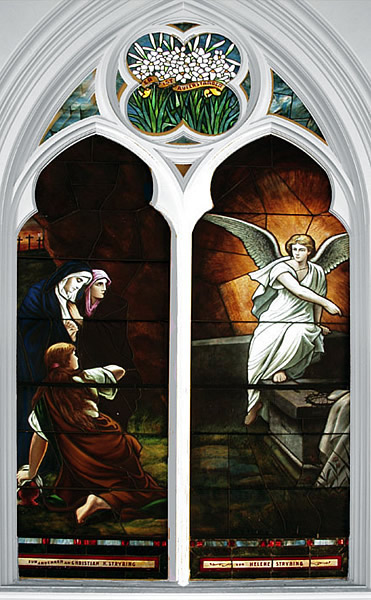Rachel and I just got back from the annual Synod Assembly. Each year, clergy and laypeople of the Sierra Pacific Synod, of which we here at St. Matthew’s are a part, come together for three days of prayer and worship, keynotes, Bible studies, workshops, and then, of course, synod business. The theme this year was: We are church together – sharing our stories.
Just under 500 people were gathered in Fresno the last three days. And, as Andreas, who went as a lay voting member last year, pointed out: it’s a special experience. Lutheran Christians from different places, with different backgrounds, different ways of celebrating worship, and also increasingly different skin colors, languages and sexual orientations, people from quite different roads of life, come together. And together, we are church. Together, we can accomplish many things, like collecting items for the Fresno Women’s and Childrens’ Center (the picture shows Rachel and me contributing St. Matthew’s donations to the ever growing pile of diapers and personal items for women). It is good to remember that we are part of something much bigger than what we experience here. Although what we experience here is pretty cool – Bishop Mark Holmerud included the visit of EKD Chairperson Heinrich Bedford-Strohm for the Kaffeeklatsch and organ rededication we celebrated here last September as one of his highlights of the last year in his slide show report. We can and should be proud of what’s happening in this worshiping community.
But it is good to remember that we are but one small member of the global body of Christ. And even the Sierra Pacific Synod is but a small representation of the Christian church in this country and around the globe. We are sheep of one huge flock, and part of an amazingly large and diverse family of faith.
We are not alone. And so our Christian faith primarily is not about our personal relationship with God, and faith ultimately is not a private matter, but our faith binds us together in community with God and each other. We are church together, for the sake of each other and for the sake of the world.
Our church today of course has its roots in the very first congregation that gathered in Christ’s name in Jerusalem. We heard about it in our first lesson from Acts this morning – the first converts and followers of Christ gathered, devoted themselves to the teachings of the apostles and fellowship, the breaking of the bread and prayers. Signs and wonders were done among them, and they had all things in common, because the rich would sell their possessions and share the proceeds with all according to their needs. Now talk about true communion! And we get the sense that there is something special going on here, that the faith in Christ, who is love and grace incarnate, truly transcends the believers and makes them one.
But things happened, even back then, that challenged the young and fairly homogeneous community of Christians. There were squabbles about leadership. Some withheld of their possessions and could not commit to sharing what they had with others for the commonwealth and common good. And then Paul started evangelizing the others, pagans, the uncircumcised, people beyond the realm of Jerusalem and Judea and Galilee, beyond the Jewish people, outside of the temple. Paul and Peter were really butting heads over this, and you can read about this in the Acts of the Apostles and then here and there in the letters of Peter and Paul. It was quite contentious: who is invited to be part of the young Christian congregation, the flock of believers? What are the conditions to be accepted?
That first group in Jerusalem, which was quite small and intimate, which met in the temple and broke bread together, that first group of Christians probably felt a little threatened by the idea that Christ’s church was meant to be something much bigger than themselves, and that unfamiliar people and customs and languages and foods and styles of worship might challenge and shake up their quite familiar group. But eventually, those very first followers of Christ had to accept the fact that Christ actually meant it when he said, ‘Go therefore and make disciples of all peoples and baptize them in the name of the Father and of the Son and of the Holy Spirit, and teach them to keep all that I have commanded you. And see, I am with you always, to the end of the days.’
Jesus Christ already implied that faith is not about being static and remaining in the familiar, but about going and seeking out people where they are, people who might be quite different from who and what we are.
The Synod Assembly of course wasn’t just one three day love feast. No, we heard and talked about challenges we are facing as church and church together today. We all know things have changed and continue to change. We just have to look at the recent history of St. Matthew’s to see that we cannot just expect new German speakers to show up at our doorstep, and when they show up, we cannot expect them to come each and every Sunday. Fewer and fewer people worship here on a regular basis, fewer and fewer people participate in all those German clubs and choirs. The Evangelical Lutheran Church in America is shrinking, it’s not just us. On the same token, Lutheran congregations in sub-Saharan Africa and South America are growing. There are more dark skinned Lutherans than light skinned Lutherans in the world today.
Our neighborhoods change, and the minorities in this country are about to become the majority. And minorities speak up for their rights now, in movements like Black Lives Matter. And we are just like that first congregation in Jerusalem, close-knit, familiar with each other, somewhat shaken up by what happens around us, and hanging on to what we know, because it gives us comfort. We are hanging on to what Dr. David Vasquez-Levy, keynote speaker at the Synod Assembly and current president of Pacific School of Religion in Berkeley and a Lutheran who originates from Guatemala, calls ‘fixed points of reference’; and, yes, he pointed out that we are grieving the loss of those fixed points of reference. We feel insecure and scared when things change around us and we are forced to reorient ourselves. Just like that first congregation in Jerusalem, we are not sure what to make of all those folks who are unfamiliar to us, with different customs and languages and foods and styles of worship. And, just like the first congregation in Jerusalem, I believe we have to accept eventually that we are called to embrace those changes around us rather than reject them.
And, as Vasquez-Levy pointed out in his talk, Jesus never was a static presence, Jesus is a moving object, a moving target. In all his ministry on earth, Jesus was never still and talked about himself as someone who has nowhere to lay his head. I mean, he even was born on the move, in a makeshift shelter. Last week, in the Emmaus story, we heard how Jesus disappeared the moment the two disciples who he walked with from Jerusalem recognize him in the breaking of the bread. The risen Christ cannot be nailed down.
And just think about today’s lessons, Psalm 23 and the gospel we heard from John. Don’t we all love Psalm 23? Let’s recite the first line together: The Lord is my shepherd, I shall not want. But what does a shepherd do? Well, first of all, there is no personal shepherd who leads just one single sheep, no, there is an entire flock. We are church together. A shepherd leads the flock from place to place, from one pasture to the next, from one still water to the other and right through the valley of the shadow of death. The flock is on the move. There is constant change. We are on a journey. As I said last week, we are constantly on the road to Emmaus.
And that’s why it is so important to know the voice of the shepherd and to listen to it, as we heard in today’s gospel, because the shepherd knows how to maneuver difficult terrain. And, boy, are we ever in difficult and challenging terrain in this world today, a world that seems to become more selfish and callous and cynical with each passing moment. It’s important to listen to this shepherd’s voice, the voice of one who cares for the entire flock, for the young and the old, the healthy and the sick, the constant followers and the lost. The voice of the one who commands us to love one another. We mustn’t listen to all those thieves who tell us otherwise, who reason that society works best if everybody fends for themselves. That’s not how the flock, how any community works. Yes, the world may change, our journey with Christ may take us to unfamiliar territory, but we have the moral compass of Christian love and grace which we are called to share freely, just like Christ shared it freely.
And this shared love and the community that grows out of it is something that we can hold on to. Jesus, the shepherd, is our moving target, leading us to ever new and surprising places, but we can trust in him and his guidance. Christ unites us, his love and grace and care unite us. We may have our differences, we may all be quite different from each other, but we are church together. Together with all those diverse and maybe quite unfamiliar people whom God calls into community as fellow children of God. We are not alone. And in Christ, we are one. We are church together.


